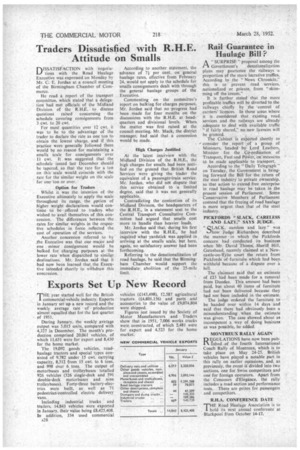Traders Dissatisfied with R.H.E. Attitude on Smalls
Page 30

If you've noticed an error in this article please click here to report it so we can fix it.
niSSATISFACTION with negotia
tions with the Road Haulage Executive was expressed on Monday by Mr. C. E. Jordan at a council meeting of the Birmingham Chamber or Commerce.
He read a report of the transport committee, which stated that a delegation had met officials of the Midland Division of the R.HE. to discuss questions raised concerning the schedule covering consignments from 3 cwt. to 20 cwt.
For most quantities over 12 cwt, it was to be to the advantage of the trader to declare the rate as one ton to obtain the lowest charge, and if this practice were generally followed there would be no reason for maintaining a smalls scale for consignments over 11 cwt, It was suggested that the schedule issued last December should be tapered, so that the rate for a too on this scale would coincide with the rate for the similar weight on the scale for one ton or over.
Option for Traders
Whilst it was the intention of the Executive ultimately to apply the scale throughout its range. the potion of higher weight declarations would continue to be offered to traders who wished to avail themselves of this concession. The differences between the rates for similar weights in the respective schedules in force reflected the cost of operation of the services.
Another concession referred to by the Executive was that one major and one minor consignment would be bulked for charging purposes at the lower rate when dispatched to similar destinations. Mr. Jordan said that it had now been learned that the Executive intended shortly to withdraw this concession.
According to another statement, the advance of 7i per cent, on general haulage rates, effective from February 24, would not apply to the schedule for smalls consignments dealt with through the general haulage groups of the Executive.
Commenting on the committee's report on bulking for charges purposes, Mr. Jordan said that no progress had been made for four months on the discussions with the R.H.E. at headquarters and divisional levels. When the matter was first raised at the council meeting. Mr. Mack, the district manager, had said that a concession would be made.
High Charges Justified
At the latest inteiview with the Midland Division of the R.H.E., the high charges for smalls had been justified on the ground that British Road Services were giving the trader the equivalent of a passenger-train service. Mr. Jordan, who did not dispute that this service obtained tia a limited degree, said that it was not generally applicable.
Contradicting the contention of its Midland Division, the headquarters of the R.H.E., in a statement sent to the Central Transport Consultative Committee had argued that smalls cost more to handle than heavier loads.
Mr. Jordan said that, during his first interview with the R.H.E., he had inquired what yardstick was applied in arriving at the smalls scale, but here. again, no satisfactory answer had been forthcoming.
Referring to the denationalization of road haulage, he said that the Birmingham Chamber would support the immediate abolition of the 25-mile limit.




















































































